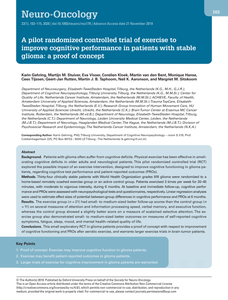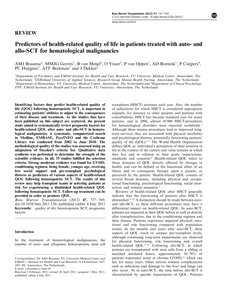Introduction Around 25% of metastatic breast cancer (mBC) patients develop brain metastases, which vastly affects their overall survival and quality of life. According to the current clinical guidelines, regular magnetic resonance imaging screening is not recommended unless patients have recognized central nervous system-related symptoms. Patient Presentation The patient participated in the EFFECT study, a randomized controlled trial aimed to assess the effects of a 9-month structured, individualized and supervised exercise intervention on quality of life, fatigue and other cancer and treatment-related side effects in patients with mBC. She attended the training sessions regularly and was supervised by the same trainer throughout the exercise program. In month 7 of participation, her exercise trainer detected subtle symptoms (e.g., changes in movement pattern, eye movement or balance), which had not been noticed or reported by the patient herself or her family, and which were unlikely to have been detected by the oncologist or other health care providers at that point since symptoms were exercise related. When suspicion of brain metastases was brought to the attention of the oncologist by the exercise trainer, the response was immediate, and led to early detection and treatment of brain metastases. Conclusion and clinical implications The brain metastases of this patient were detected earlier due to the recognition of subtle symptoms detected by her exercise trainer and the trust and rapid action by the clinician. The implementation of physical exercise programs for cancer patients requires well-trained professionals who know how to recognize possible alterations in patients and also, good communication between trainers and the medical team to enable the necessary actions to be taken.
DOCUMENT

INTRODUCTION: After treatment with chemotherapy, many patients with breast cancer experience cognitive problems. While limited interventions are available to improve cognitive functioning, physical exercise showed positive effects in healthy older adults and people with mild cognitive impairment. The Physical Activity and Memory study aims to investigate the effect of physical exercise on cognitive functioning and brain measures in chemotherapy-exposed patients with breast cancer with cognitive problems.METHODS AND ANALYTICS: One hundred and eighty patients with breast cancer with cognitive problems 2-4 years after diagnosis are randomised (1:1) into an exercise intervention or a control group. The 6-month exercise intervention consists of twice a week 1-hour aerobic and strength exercises supervised by a physiotherapist and twice a week 1-hour Nordic or power walking. The control group is asked to maintain their habitual activity pattern during 6 months. The primary outcome (verbal learning) is measured at baseline and 6 months. Further measurements include online neuropsychological tests, self-reported cognitive complaints, a 3-tesla brain MRI, patient-reported outcomes (quality of life, fatigue, depression, anxiety, work performance), blood sampling and physical fitness. The MRI scans and blood sampling will be used to gain insight into underlying mechanisms. At 18 months online neuropsychological tests, self-reported cognitive complaints and patient-reported outcomes will be repeated.ETHICS AND DISSEMINATION: Study results may impact usual care if physical exercise improves cognitive functioning for breast cancer survivors.TRIAL REGISTRATION NUMBER: NTR6104.
DOCUMENT

PURPOSE: In this study we aimed (1) to identify the most prevalent physical symptoms and functional limitations that limit physical activity of patients with palliative treatment for metastatic breast cancer (MBC) and (2) to identify their preferences for exercise-based physical therapy programs, as a first step towards the development of physical therapist (PT)-guided exercise programs for patients with MBC.METHODS: We performed a mixed-method study that comprised a cross-sectional survey and two focus group sessions among patients with MBC. Survey results were analyzed using descriptive statistics. The focus groups were audio-taped, transcribed verbatim, and analyzed independently by two researchers, using directed content analysis.RESULTS: A total of 114 women (response rate 61%) completed the survey (mean age 63.5, SD 10.2). Eighty-six percent of the women reported at least some level of physical problems limiting their ability to be physically active, of whom 46% reported substantial problems. The most prevalent problems were fatigue, painful joints, painful muscles, and shortness of breath. Uptake of exercise appeared to be limited. Exercise preferences varied strongly. Fifty-three percent indicated a preference for some form of PT-supervision, and 34% for a prolonged period of time (> 8 weeks). Focus group results clarified that patients' preferences for supervision, by PTs with special qualifications in oncology, were related to feelings of insecurity about their ability to self-manage physical functioning.CONCLUSIONS: Patients with MBC experience a broad range of physical health problems that limit their ability to be physically active. While preferences vary strongly, patients with MBC would value the availability of high quality, PT-guided, tailored exercise programs.
DOCUMENT
Abstract Background: Patients with glioma often suffer from cognitive deficits. Physical exercise has been effective in ameliorating cognitive deficits in older adults and neurological patients. This pilot randomized controlled trial (RCT) explored the possible impact of an exercise intervention, designed to improve cognitive functioning in glioma patients, regarding cognitive test performance and patient-reported outcomes (PROs). Methods: Thirty-four clinically stable patients with World Health Organization grades II/III glioma were randomized to a home-based remotely coached exercise group or an active control group. Patients exercised 3 times per week for 20-45 minutes, with moderate to vigorous intensity, during 6 months. At baseline and immediate follow-up, cognitive performance and PROs were assessed with neuropsychological tests and questionnaires, respectively. Linear regression analyses were used to estimate effect sizes of potential between-group differences in cognitive performance and PROs at 6 months. Results: The exercise group (n = 21) had small- to medium-sized better follow-up scores than the control group (n = 11) on several measures of attention and information processing speed, verbal memory, and executive function, whereas the control group showed a slightly better score on a measure of sustained selective attention. The exercise group also demonstrated small- to medium-sized better outcomes on measures of self-reported cognitive symptoms, fatigue, sleep, mood, and mental health-related quality of life. Conclusions: This small exploratory RCT in glioma patients provides a proof of concept with respect to improvement of cognitive functioning and PROs after aerobic exercise, and warrants larger exercise trials in brain tumor patients.
DOCUMENT

Identifying factors that predict health-related quality of life (QOL) following hematopoietic SCT, is important in estimating patients’ abilities to adjust to the consequences of their disease and treatment. As the studies that have been published on this subject are scattered, the present study aimed to systematically review prognostic factors for health-related QOL after auto- and allo-SCT in hematological malignancies. A systematic, computerized search in Medline, EMBASE, PsycINFO and the Cochrane Library was conducted from 2002 to June 2010. The methodological quality of the studies was assessed using an adaptation of Hayden's criteria list. Qualitative data synthesis was performed to determine the strength of the scientific evidence. In all, 35 studies fulfilled the selection criteria. Strong–moderate evidence was found for GVHD, conditioning regimen, being female, younger age, receiving less social support and pre-transplant psychological distress as predictors of various aspects of health-related QOL following hematopoietic SCT. The results of this review may help transplant teams in selecting patients at risk for experiencing a diminished health-related QOL following hematopoietic SCT. Follow-up treatment can be provided in order to promote QOL.
DOCUMENT

Study goal: This study was carried out to answer the following research question: which motivation do healthy volunteers have to participate in phase I clinical trials? - Methods: A literature search was done through Google Scholar and Academic Search Premier, followed by three interviews with volunteers who had recently concluded their participation in a (non-commercial) phase I trial. - Results: Our literature search revealed mainly commercial motives for volunteers to participate in phase I clinical trials. The interviews (with volunteers in a non-commercial trial) showed that other factors may also play a decisive role, such as: (1) wish to support the investigator (2) wish to contribute to science, (3) access to more/better health care (4) sociability: possibility to relax and to communicate with other participants (5) general curiosity. Precondition is that risks and burden are deemed acceptable. - Conclusions: financial remuneration appears to be the predominant motive to participate voluntarily in a clinical trial. Other reasons were also mentioned however, such as general curiosity, the drive to contribute to science and the willingness to help the investigator. In addition, social reasons were given such as possibility to relax and to meet other people. Potential subjects state that they adequately assess the (safety) risks of participating in a trial as part of their decision process.
DOCUMENT
